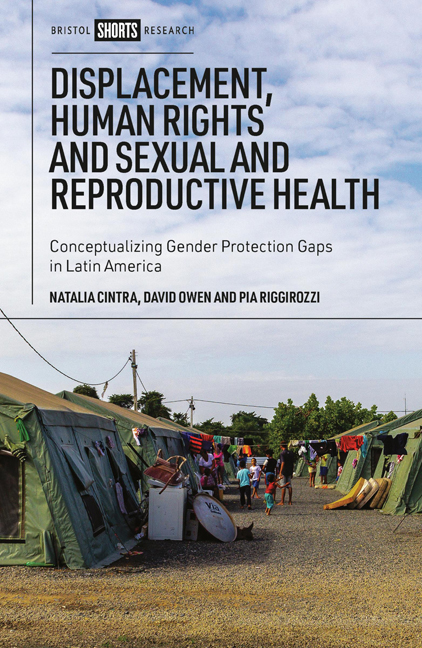 Displacement, Human Rights and Sexual and Reproductive Health
Displacement, Human Rights and Sexual and Reproductive Health Book contents
- Frontmatter
- Dedication
- Contents
- List of Figures and Tables
- Acknowledgements
- Introduction
- One The Gendered Character of Forced Migration
- Two Problematizing the Migrant– Refugee Distinction in Latin America
- Three Latin American Normative Frameworks of Migration and Asylum
- Four Protecting the Human Right to Health of Women and Girls from Venezuela as Necessary Fleers
- Five Responsibility and the Ethics of Forced Displacement in South America
- Conclusion
- Notes
- References
- Index
Conclusion
Published online by Cambridge University Press: 18 January 2024
- Frontmatter
- Dedication
- Contents
- List of Figures and Tables
- Acknowledgements
- Introduction
- One The Gendered Character of Forced Migration
- Two Problematizing the Migrant– Refugee Distinction in Latin America
- Three Latin American Normative Frameworks of Migration and Asylum
- Four Protecting the Human Right to Health of Women and Girls from Venezuela as Necessary Fleers
- Five Responsibility and the Ethics of Forced Displacement in South America
- Conclusion
- Notes
- References
- Index
Summary
The gendered character of forced migration is brought into sharp relief by the mass displacement of Venezuelan women and girls. Not only are they compelled to flee for reasons that are typically either gender-specific (the collapse of maternal healthcare) or gender-inflected (as primary agents of familial care work), but they also confront gender-specific challenges in transit to, and reception and settlement in, countries of protection. Focusing on SRH provides a lens through which the gendered nature of their displacement and the necessity of gendered forms of protection is made visible even as it exposes a series of protection gaps that the failure to recognize the distinctive character of female forced migration generates.
The first and foremost of these gaps is the conceptual and normative failure of the protection regime to acknowledge that women and girls may have practically necessary reasons for flight not captured by legal conceptions of refugeehood. These conceptions are predicated on identifying this status with a limited range of specific causes or grounds of flight and hence with constructing the refugee– migrant binary in ways that allocate some forced migrants to one category and others to another. We have argued that addressing this conceptual failure and articulating a robust ethics of forced displacement can be accomplished by adopting Aleinikoff and Zamore's turn to the category of ‘necessary fleer’ and a framework of protection based on this status. We argue that the category of ‘necessary fleer’ distinguishes those who have compelling reasons of flight grounded in concern for protection of their basic rights from those who do not have such reasons of practical necessity. This combination of generality (in not tying international protection to specific grounds of flight) and singularity (in taking up the question of flight from the first personal perspective of the embodied agent faced with the practical question of whether to flee) overcome the conceptual and ethical problems posed by the migrant– refugee binary and disable the political uses of that binary. This provides us with a critical framework from which to reflect on the governance of forced migration in general and the governance of protection for Venezuelans in South America in particular, and to do so in a way that is sensitive to the gendered character of displacement.
- Type
- Chapter
- Information
- Displacement, Human Rights and Sexual and Reproductive HealthConceptualizing Gender Protection Gaps in Latin America, pp. 151 - 158Publisher: Bristol University PressPrint publication year: 2023


